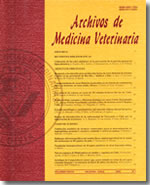Haematological and pathological findings of pigs experimentally inoculated with a Chilean isolate of porcine reproductive and respiratory syndrome virus
Main Article Content
Abstract
The aims of this study were to characterize the haematological and bone marrow changes, gross and microscopic lesions of pigs experimentally inoculated with the Chilean isolate of porcine reproductive and respiratory syndrome virus. Twelve 3-week-old pigs were divided in 4 groups of 3, one of which corresponded to the negative control group sacrificed at 0 days post-inoculation (dpi), and the 3 remaining groups corresponded to the inoculated pigs sacrificed at 7, 14 and 21 dpi. For each sampling period blood was collected for complete haemograme and at the necropsy time gross lesions were registered and samples for both bone marrow smears and histopathology were taken. The results of this study revealed haematological alterations characterized by a significant reduction (P<0.05) in the haematocrit and a significant increase (P<0.05) in the total leukocyte count associated with an increase in the monocytes and baciliforms. The bone marrow did not show significant variations in the ratio of myeloid to erythroid cells (P>0.05). At the same time, the gross lesions were mild and mainly characterized by the presence of conjunctivitis, periocular edema and a slight increase in the size of the lymph nodes. Microscopic lesions were characterized by the presence of interstitial pneumonia, depletion and necrosis in lymphoid organs, rhinitis, hepatitis, myocarditis and non-purulent encephalitis. These findings suggest that the Chilean isolate of the vPRRS to a strain with a low virulence.

